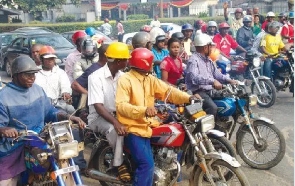The above statement seems to be a recurring poser on the minds of many people in view of the excesses and lawlessness being perpetrated by commercial motorcycle (Okada) riders in many states across the country with the attendant maiming and loss of lives on a daily basis. Why is it really difficult to check the excesses of Okada riders? The high level of unemployment in the land has no doubt pushed many Nigerian youths into commercial motorcycling. The use of motorcycle as a means of road transport is taken to complement motor vehicles, an advanced form of bicycles, because it is cheap, requires no fuelling to operate, and can easily manoeuvre heavy traffic caused by vehicles.
What do we have today? There has been no effective strategy to regulate Okada operations as a means of transport and in no time, it had become an all-comers’ affair as criminal-minded persons began to use them for their nefarious activities. Many politicians often use the donation of motorcycles to the people as constituency projects. Several kidnappers, rapists, and armed robbers see motorcycles as an easy get-away transport system to aid criminal operations. Part of the reasons for the riders’ recklessness is that most of them are neither trained nor licensed to operate thus, constituting fatal risks to themselves and society. Often high on psychotropic substances, most riders throw caution to the winds and ignore traffic rules with impunity. Those making case for the continued existence of Okada argue that most of the operators do not have the requisite knowledge of road safety laws, as they have called for better education and enforcement of traffic rules.
In Lagos State, the government announced restrictions on Okada and tricycles in six local government areas in January 2020. It had claimed that over 11,000 persons were killed between 2011 and 2019 while 600 deaths were recorded between 2018 and 2019. At a point, the casualty figures became worrisome such that the government’s main hospital had a section designated as ‘An Okada ward’. In a move to address the challenge, it proscribed Okada and tricycles from plying 40 bridges and flyovers across the state.
What is staring us in the face is that with the population of Lagos, predicted to double by 2050, there is the need to embark on the massive erection of transport infrastructure such as metro and underground networks to meet up with the population surge. A peep into a report of the Federal Road Safety Corps October Road Traffic Crash Report 2016, gives another scary outlook that commercial motorcyclists have remained a major cause of fatal road traffic accidents across the country. According to the report, motorcycle accidents ranked third after cars, which accounted for 457 cases or 36 per cent, followed by mini-buses with 243 or 19 per cent of the total figures. The Corps had to advise the Secretary to the Government of the Federation to encourage state governments to ban the use of motorcycles for commercial purposes. Before then, the National Council on Transport had recommended a nationwide ban on commercial motorcycles in Nigeria.
In tackling the challenge, some state governments in the North have banned the use of motorcycles for commercial purposes in Plateau, Kano, Katsina, and Kaduna. In 2010, Plateau State signed into law, the bill prohibiting operations of commercial motorcycles within the Jos-Bukuru metropolis. The law was initially resisted by the operators, but the state still went ahead with its implementation even though riders operate in the suburbs, and are not allowed in the city centre before the state the government allowed the introduction of tricycles. However, motorcycle riders reportedly make incursions into the city centre by beating security agencies. In 2011, Kano State banned the use of motorcycles and subsequent administrations sustained the ban. What was allowed was the riding of motorcycles by one person alone. This was done to check activities of insurgents found to be using motorcycles to commit atrocities.
What the case studies suggest is that with the joint efforts of stakeholders and putting in place necessary legislation, the issue can be properly addressed. Politicians should look for other means of touching the lives of their people without flooding the streets with motorcycles. Security agents should be more effective in curtailing the excesses of Okada riders by enforcing traffic laws. Designated lanes should be assigned to Okada to reduce contacts with motorists. The unemployment crisis should be tackled, effective collaboration encouraged with riders’ association, police, and road safety corps, to see the current challenge as a collective task that must be tackled headlong.
Opinions of Friday, 21 May 2021
Columnist: Dr. Adewale Kupoluyi















